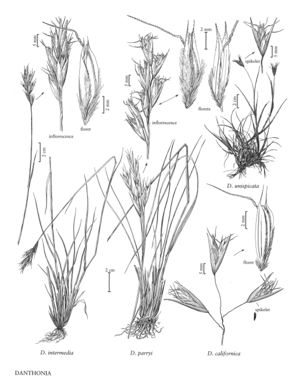Difference between revisions of "Danthonia intermedia"
FNA>Volume Importer |
FNA>Volume Importer |
||
| Line 23: | Line 23: | ||
-->{{Treatment/Body | -->{{Treatment/Body | ||
|distribution=Colo.;N.Mex.;Wash.;Utah;Alaska;Alta.;B.C.;Man.;Nfld. And Labr.;Ont.;Que.;Sask.;Yukon;Mich.;Idaho;Mont.;S.Dak.;Wyo.;Ariz.;Calif.;Nev.;Oreg. | |distribution=Colo.;N.Mex.;Wash.;Utah;Alaska;Alta.;B.C.;Man.;Nfld. And Labr.;Ont.;Que.;Sask.;Yukon;Mich.;Idaho;Mont.;S.Dak.;Wyo.;Ariz.;Calif.;Nev.;Oreg. | ||
| − | |discussion=<p | + | |discussion=<p>Danthonia intermedia grows in boreal and alpine meadows, open woods, and on rocky slopes and northern plains. Its range extends from Kamchatka, Russia, to North America, south along the cordillera, and east, through boreal and alpine regions, to Quebec and Newfoundland and Labrador. Its primarily cleistogamous reproduction has probably facilitated its establishment and spread through more boreal and alpine habitats than other members of the genus.</p><!-- |
| − | --><p>Tzvelev (1976) treats the American plants as | + | --><p>Tzvelev (1976) treats the American plants as D. intermedia (Vasey) subsp. intermedia and the Russian plants, which have 2n = 18, as D. intermedia subsp. riabuschinskii (Kom.) Tzvelev.</p> |
|tables= | |tables= | ||
|references= | |references= | ||
| Line 40: | Line 40: | ||
|basionyms= | |basionyms= | ||
|family=Poaceae | |family=Poaceae | ||
| + | |illustrator=Linda A. Vorobik and Hana Pazdírková | ||
|distribution=Colo.;N.Mex.;Wash.;Utah;Alaska;Alta.;B.C.;Man.;Nfld. And Labr.;Ont.;Que.;Sask.;Yukon;Mich.;Idaho;Mont.;S.Dak.;Wyo.;Ariz.;Calif.;Nev.;Oreg. | |distribution=Colo.;N.Mex.;Wash.;Utah;Alaska;Alta.;B.C.;Man.;Nfld. And Labr.;Ont.;Que.;Sask.;Yukon;Mich.;Idaho;Mont.;S.Dak.;Wyo.;Ariz.;Calif.;Nev.;Oreg. | ||
|reference=None | |reference=None | ||
| Line 45: | Line 46: | ||
|publication year= | |publication year= | ||
|special status= | |special status= | ||
| − | |source xml=https:// | + | |source xml=https://bibilujan@bitbucket.org/aafc-mbb/fna-data-curation.git/src/314eb390f968962f596ae85f506b4b3db8683b1b/coarse_grained_fna_xml/V25/V25_965.xml |
|subfamily=Poaceae subfam. Danthonioideae | |subfamily=Poaceae subfam. Danthonioideae | ||
|tribe=Poaceae tribe Danthonieae | |tribe=Poaceae tribe Danthonieae | ||
Revision as of 17:19, 30 October 2019
Culms 10-50(70) cm, not disarticulating at maturity. Sheaths usually glabrous; blades 5-10 cm long, 1-3.5 mm wide, glabrous or slightly pilose. Inflorescences with (4)5-10 spikelets; branches stiff, appressed or strongly ascending; lower branches with (1)2-3(5) spikelets; pedicels on the lowest branch shorter than the spikelets. Spikelets 11-15(19) mm. Calluses of middle florets longer than wide, concave abaxially; lemma bodies 3-6 mm, glabrous over the back, densely pilose along the margins, teeth 1.5-2.5 mm, acute to acuminate or aristate; awns 6.5-8 mm; anthers usually tiny, sometimes to 4 mm. Caryopses (2)2.3-3 mm long, 0.7-1.1 mm wide. Cleistogenes rarely produced. 2n = 36, 98.
Distribution
Colo., N.Mex., Wash., Utah, Alaska, Alta., B.C., Man., Nfld. And Labr., Ont., Que., Sask., Yukon, Mich., Idaho, Mont., S.Dak., Wyo., Ariz., Calif., Nev., Oreg.
Discussion
Danthonia intermedia grows in boreal and alpine meadows, open woods, and on rocky slopes and northern plains. Its range extends from Kamchatka, Russia, to North America, south along the cordillera, and east, through boreal and alpine regions, to Quebec and Newfoundland and Labrador. Its primarily cleistogamous reproduction has probably facilitated its establishment and spread through more boreal and alpine habitats than other members of the genus.
Tzvelev (1976) treats the American plants as D. intermedia (Vasey) subsp. intermedia and the Russian plants, which have 2n = 18, as D. intermedia subsp. riabuschinskii (Kom.) Tzvelev.
Selected References
None.
